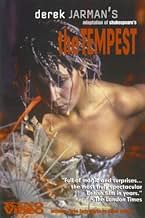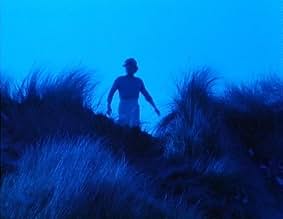IMDb RATING
6.3/10
1.3K
YOUR RATING
Banished to a forsaken island, the Right Duke of Milan and Sorcerer Prospero gets the chance to take his revenge on the King of Naples with the assistance of his airy spirit-servant, Ariel.Banished to a forsaken island, the Right Duke of Milan and Sorcerer Prospero gets the chance to take his revenge on the King of Naples with the assistance of his airy spirit-servant, Ariel.Banished to a forsaken island, the Right Duke of Milan and Sorcerer Prospero gets the chance to take his revenge on the King of Naples with the assistance of his airy spirit-servant, Ariel.
- Director
- Writers
- All cast & crew
- Production, box office & more at IMDbPro
Featured reviews
"Speak the speech, I pray you, as I pronounc'd it to you, trippingly on the tongue; but if you mouth it, as many of our players do, I had as lief the town-crier spoke my lines."
Those are the directions that Hamlet gives the players on how to perform the Mousetrap. While the rhythms of Elizabethan English are difficult for Americans, they seems to come naturally for British actors, and those here perform it well enough.
The problems with this production arise, as they often do for THE TEMPEST, from the director's efforts to make it visually striking. Because of the magic that lies at the heart of Shakespeare's autumnal work, its gorgeous language has fallen prey to people who think the best way to stage it is to think what Quentin Crisp would sneer at as too camp and turn it up a couple of notches. One Shakespeare in the Park staging required a dozen people to play Ariel, including a Sumo wrestler; and Peter Greenaway's gloss on the play, PROSPERO'S BOOK, is so bad that when I saw it with some friends, I disrupted the occasion by guffawing at the over-the-top images. They show up here, too.
What all these geniuses fail to realize is that the play is a boy-meets-girl story, something Shakespeare wrote several dozen times. At its core is a coming-of-age story for Miranda, an adolescent girl who is old enough to leave her father. She is confronted by various male archetypes before settling on the only boy her own age. The Bard of Avon's message is so normal, that like should marry like, that youth calls to youth and that Show Business is the process of taking these ordinary and important stories and making us pay for them by wrapping them in mystery ... well, so normal that people miss the point.
The play's real magic is the story of Rapunzel and Snow White and all the other fairy tales which Bruno Bettelheim has shredded to show their symbolic content. That and the language. These should be enough for anyone like me, who cares for these things. It's too bad that the people who produced this version either don't care about Shakespeare or think that no normal person will.
Those are the directions that Hamlet gives the players on how to perform the Mousetrap. While the rhythms of Elizabethan English are difficult for Americans, they seems to come naturally for British actors, and those here perform it well enough.
The problems with this production arise, as they often do for THE TEMPEST, from the director's efforts to make it visually striking. Because of the magic that lies at the heart of Shakespeare's autumnal work, its gorgeous language has fallen prey to people who think the best way to stage it is to think what Quentin Crisp would sneer at as too camp and turn it up a couple of notches. One Shakespeare in the Park staging required a dozen people to play Ariel, including a Sumo wrestler; and Peter Greenaway's gloss on the play, PROSPERO'S BOOK, is so bad that when I saw it with some friends, I disrupted the occasion by guffawing at the over-the-top images. They show up here, too.
What all these geniuses fail to realize is that the play is a boy-meets-girl story, something Shakespeare wrote several dozen times. At its core is a coming-of-age story for Miranda, an adolescent girl who is old enough to leave her father. She is confronted by various male archetypes before settling on the only boy her own age. The Bard of Avon's message is so normal, that like should marry like, that youth calls to youth and that Show Business is the process of taking these ordinary and important stories and making us pay for them by wrapping them in mystery ... well, so normal that people miss the point.
The play's real magic is the story of Rapunzel and Snow White and all the other fairy tales which Bruno Bettelheim has shredded to show their symbolic content. That and the language. These should be enough for anyone like me, who cares for these things. It's too bad that the people who produced this version either don't care about Shakespeare or think that no normal person will.
10lumper
The stuff dreams are made of. A complete retelling of the play as a dream of vengeance: will baffle purists, but will delight the open-minded. A superb effort: great cinematography, acting, and script. 11-stars...***********
I thought this was very "different" compared to most modern interpretations of Shakespeare and enjoyed it thoroughly. It would not be useful for those studying it at school etc. as it does not show the traditional Shakespeare character interpretations (i.e- Miranda is portrayed quite punky compared to your traditional Shakespeare lady) but for understanding of the play and for the basis of the story it is a very strong piece and fantastic to watch. It does not include also the correct format, as in the layout of acts and scenes as I am currently playing Miranda in a production and most of her lines had been cut and some scenes split and mixed around but it is very useful and I would definitely recommend it as a must-see even if just to say you've seen it! Shakespeare fans would love this!
Most of the words are Shakespeare and the names are the same. This is Derek Jarman's rewrite. Then we go downhill from there. Most of the people have gratuitous birthday suit scenes; Toyah Willcox gets to show off what her 21-year-old accouterments looked like at the time.
There is an immediately recognizable actor; Peter Bull who played the Russian Ambassador Alexi de Sadesky in Dr. Strangelove or: How I Learned to Stop Worrying and Love the Bomb (1964).
Elisabeth Welch sings "Stormy Weather" - I wonder what Shakespeare would have made of that?
Even though this is supposed to be a primitive island that Prospero was just dumped on, the house even if old is too Gothic. The environment just does not fit the play in any age or place or fantasy.
I do not believe there is a version of this movie floating around out there that has "Closed Caption."
Still this needs to be added to your collection.
You may find a few of your favorite lines missing in this version.
There is an immediately recognizable actor; Peter Bull who played the Russian Ambassador Alexi de Sadesky in Dr. Strangelove or: How I Learned to Stop Worrying and Love the Bomb (1964).
Elisabeth Welch sings "Stormy Weather" - I wonder what Shakespeare would have made of that?
Even though this is supposed to be a primitive island that Prospero was just dumped on, the house even if old is too Gothic. The environment just does not fit the play in any age or place or fantasy.
I do not believe there is a version of this movie floating around out there that has "Closed Caption."
Still this needs to be added to your collection.
You may find a few of your favorite lines missing in this version.
Into this primordial mix, add some seventeenth century magic, and you have Shakespeare's "The Tempest", a play whose themes are: freedom, temperance, repentance, and forgiveness. The main difference between Shakespeare's play and Derek Jarman's film is, of course, the nearly four hundred years of change in theatrics that separate the two artists.
Jarman's version tries to adhere to the play, in that the film uses quasi-Elizabethan linguistics, which renders the dialogue difficult to understand. The play's intent is still intact in the film, if a little obscured by the language, and is conveyed mostly through the acting and the cinematography, though "adapted" in style to a more contemporary audience. Hence, the film's inventive finale features a vocal rendition of "Stormy Weather", a modern metaphor for a message that spans the ages.
Even with the updated visuals, this film is going to be a bit much for most viewers. It is just too out of sync with what modern audiences expect. On the other hand, for those few who appreciate Shakespeare, the film can be insightful, with the proviso that it is not "pure" (or literal) Shakespeare.
Jarman's version tries to adhere to the play, in that the film uses quasi-Elizabethan linguistics, which renders the dialogue difficult to understand. The play's intent is still intact in the film, if a little obscured by the language, and is conveyed mostly through the acting and the cinematography, though "adapted" in style to a more contemporary audience. Hence, the film's inventive finale features a vocal rendition of "Stormy Weather", a modern metaphor for a message that spans the ages.
Even with the updated visuals, this film is going to be a bit much for most viewers. It is just too out of sync with what modern audiences expect. On the other hand, for those few who appreciate Shakespeare, the film can be insightful, with the proviso that it is not "pure" (or literal) Shakespeare.
Did you know
- TriviaThe role of Prospero was originally intended for an older actor and John Gielgud was approached but declined. It was then offered to Terry-Thomas but his failing health caused him to turn it down. The character was then rewritten as a younger Prospero and Heathcote Williams was cast.
- Quotes
Miranda, his daughter: Oh, how beauteous mankind is. O brave new world that has such people in it!
- Crazy creditsMany Thanks To All Those Who Took An Interest and Especially... and All The Sailors Who Weathered The Storm.
- ConnectionsFeatured in Toyah (1980)
- SoundtracksStormy Weather
Written by Harold Arlen & Ted Koehler
Performed by Stephen Pruslin (as Steven Pruslin) and Dave Campbell
Sung by Elisabeth Welch
Arranged by Stephen Pruslin (as Steven Pruslin)
Produced by Guy Ford
- How long is The Tempest?Powered by Alexa
Details
- Release date
- Country of origin
- Official site
- Language
- Also known as
- Der Sturm - The Tempest
- Filming locations
- Production company
- See more company credits at IMDbPro
Box office
- Budget
- £150,000 (estimated)
- Gross worldwide
- $813
- Runtime
- 1h 35m(95 min)
- Sound mix
- Aspect ratio
- 1.37 : 1
Contribute to this page
Suggest an edit or add missing content





























